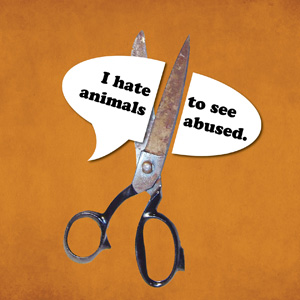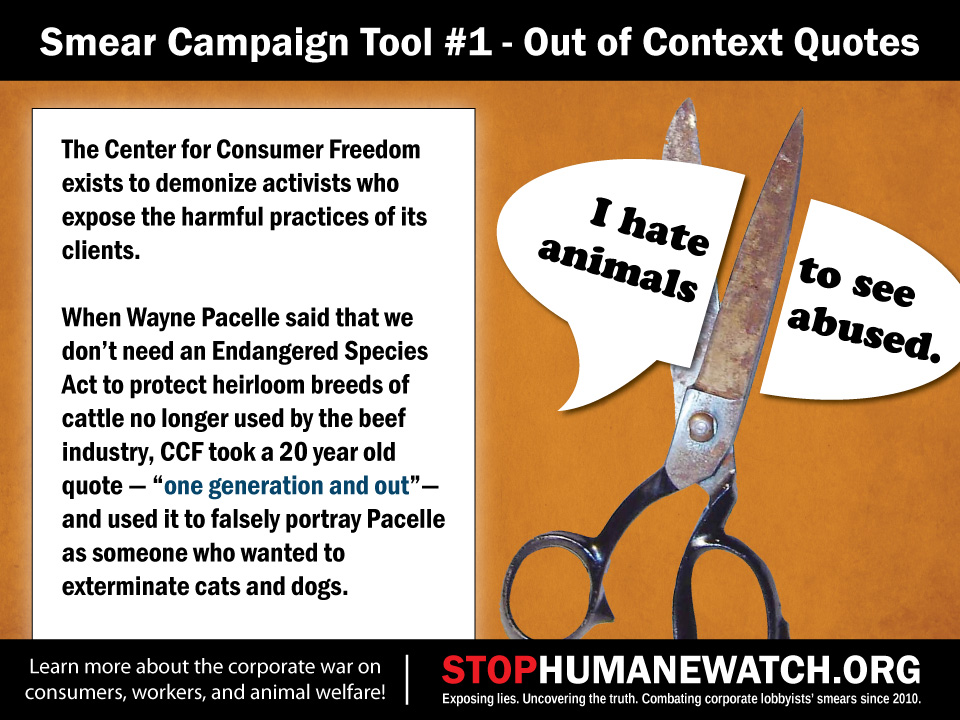
Quotations allow the reader to hear a story in the teller’s own words, with their true voice and passion. They are a window to the speaker’s soul.
And therein lies their power. When people read a quotation, they assume it is a faithful reporting of the speaker’s words.
Whenever we quote, edit or otherwise interpret what people tell us, we aim to be faithful to their meaning, so our stories ring true to those we interview.
— NPR Ethics Handbook
But what if your goal is to portray a respected animal lover as a cold, animal-hating psychopath?
If you’re Richard Berman and his hired guns, you lie.
Time after time, Berman and his smear campaigns have twisted quotes from animal activists into something unrecognizable. Consider this interview on with Wayne Pacelle on Iowa Public Radio:
Whatever your motivation for having the animal, whatever the use, you’ve got a responsibility to provide lifetime care… But if you can’t provide care for the horses, then you euthanize the animal. You can euthanize them by bringing a veterinarian out, or you can even shoot an animal in the head. We’re not saying that animals have to live indefinitely, and you have to make heroic efforts to extend the life of every animal. We’re saying that creating a commercial incentive to slaughter horses, and then having people opportunistically or disreputably gather them up, funnel them into the horse slaughter pipeline, is really catching perfectly healthy horses into the slaughter pipeline.
USDA says 92% of the horses sent to slaughter are perfectly healthy animals. This is a commercial enterprise, and we wouldn’t do this to dogs and cats. Would we set up a plant outside of Des Moines or Cedar Rapids to kill the unwanted dogs and export the meat to some foreign country? No! We would be outraged, because we have values about these animals.
Now, if you’re a credible source, you provide enough of the quote to give the reader context. But if you are CCF’s HumaneWatch, you do this:
Wayne Pacelle’s vision for horses: “Shoot [a horse] in the head.”*
Iowa Public Radio, July 2013
When one Stop HumaneWatch reader posted Pacelle’s quote in its entirety to the HumaneWatch Facebook page, they were immediately blocked by the page moderator. Clearly, the intent was not to convey Pacelle’s words; it was to deliberately misrepresent what he said. And that’s a dishonest tactic they frequently rely on.
Deception and distortions of this kind are one of the primary weapons of Berman’s smear campaigns, but they only work when the readers are unfamiliar with Berman’s legacy of deceit. That’s why we’re unveiling a series of graphics exposing another unethical weapon in Berman’s arsenal of character assassination. Each graphic in the series will highlight a different deceptive scheme, perfect for reposting under a Berman op-ed, letter to the editor, or in response to a HumaneWatch supporter who may not understand the false nature of that smear campaign.
Please feel free to save these graphics to your hard drive, link to them directly on this site, or share on Facebook, Twitter, and Pinterest.
I do get annoyed when reporters take my comments out of context in order to suit their agenda.
— Richard Berman, The Food Channel, October 6, 2010
http://www.stophumanewatch.org/blog/misquotes
View and share previous weeks’ graphics from our Resources page.





